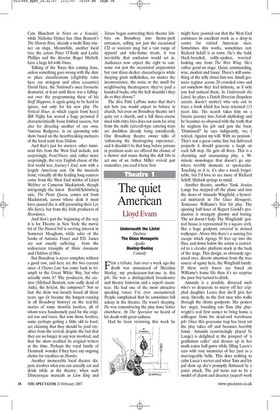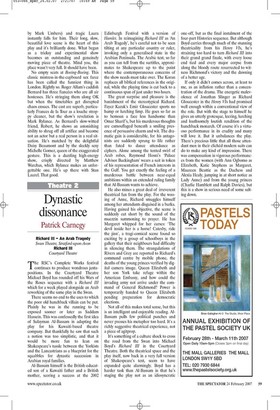The quiet American
Lloyd Evans Underneath the Lintel Duchess The Glass Menagerie Apollo Boeing-Boeing Comedy irst a tribute. Just over a week ago the death was announced of Sheridan Morley, my predecessor-but-one in this job. He was a distinguished broadcaster and theatre historian and a superb raconteur. He had one of the most attractive speaking voices I've ever encountered. People complained that he sometimes fell asleep in the theatre. He wasn't sleeping. He was remembering the play done better elsewhere. At The Spectator we heard of his death with great sadness.
Had he been reviewing this week he might have pointed out that the West End continues its excellent work as a drop-in centre for retired American stars. Sometimes this works, sometimes not. Richard Schiff is in town. He's the bald, black-bearded, softly-spoken, worriedlooking one from The West Wing. He's rather good on stage. Quiet, commanding, wise, modest and funny. There's still something of the telly about him too. Small gestures register across 20 crowded rows and yet somehow they feel intimate, as if only you had noticed them. In Underneath the Lintel, he plays a Dutch librarian (hopeless accent, doesn't matter) who sets out to trace a book which has been returned 113 years late. His search takes him on a bizarre journey into Jewish mythology and he becomes so obsessed with the truth that he neglects his job and gets the boot. 'Dismissed?' he says indignantly, 'no, I retired. Against my will. With no pension.' That's not a great comic line but delivered properly it should generate a laugh on each full stop. He gets all three. This is a charming and unassuming play, a 90minute monologue that doesn't go anywhere terribly dramatic or spectacular. Touching as it is, it's also a touch forgettable, but I'd love to see more of Richard Schiff. Shylock springs to mind.
Another theatre, another Yank. Jessica Lange has stepped off the plane and into the shoes of Amanda Wingfield, a hysterical matriarch in The Glass Menagerie, Tennessee Williams's first hit play. The opening half-hour of Rupert Goold's production is strangely gloomy and boring. The set doesn't help. The Wingfields' genteel house is represented by a square arch, like a huge goalpost, covered in stained wallpaper. Above this there's a soaring fire escape which zigzags 50 feet up into the flies, and down below the action is restricted to a circular platform stuck at the back of the stage. This design, so obviously agonised over, diverts attention from the true source of agony here, the Wingfield family. If these sorry losers are based on Williams's home life then it's no surprise the poor boy turned to drink.
Amanda is a prudish, divorced snob who's so desperate to marry off her crippled daughter Laura that she'll give her away, literally, to the first man who walks through the chintz goalposts. She pesters her angry, brooding son Tom (the playwright's real first name) to bring home a colleague from his dead-end warehouse job. Once this gruesome trap has been set the play takes off and becomes horribly funny. Amanda (convincingly played by Lange) is delighted at the prospect of 'a gentleman caller' and dresses up in her moth-eaten ball-gown while filling Laura's ears with rosy memories of her past as a marriageable belle. This does nothing to calm Laura's nerves and when Tom and his pal show up she's promptly flattened by a panic attack. The pal turns out to be a model of charm and decency (superb work by Mark Umbers) and tragic Laura instantly falls for him Their long, slow, beautiful love scene is the heart of this play and it's brilliantly done. What began as a tricksy and experimental show becomes an outstanding and genuinely moving piece of theatre. Mind you, the place wasn't very full. It should have been.
No empty seats at Boeing-Boeing. This classic mistress-in-the-cupboard sex farce has been called the funniest thing in London. Rightly so. Roger Allam's caddish Bernard has three fiancées who are all air hostesses. He's stringing them along OK but when the timetables get disrupted chaos ensues. The cast are superb, particularly Frances de la Tour as a louche stroppy cleaner, but the show's revelation is Mark Rylance. As Bernard's slow-witted friend, Robert, he shows an astonishing ability to shrug off all artifice and become not an actor but a real person in a real situation. He's matched by the delightful Daisy Beaumont and by the sleekly sexy Michelle Gomez, queen of the exaggerated gesture. This is a dazzling high-energy show, crisply directed by Matthew Warchus, which Rylance makes an unforgettable one. He's up there with Stan Laurel. That good.























































 Previous page
Previous page